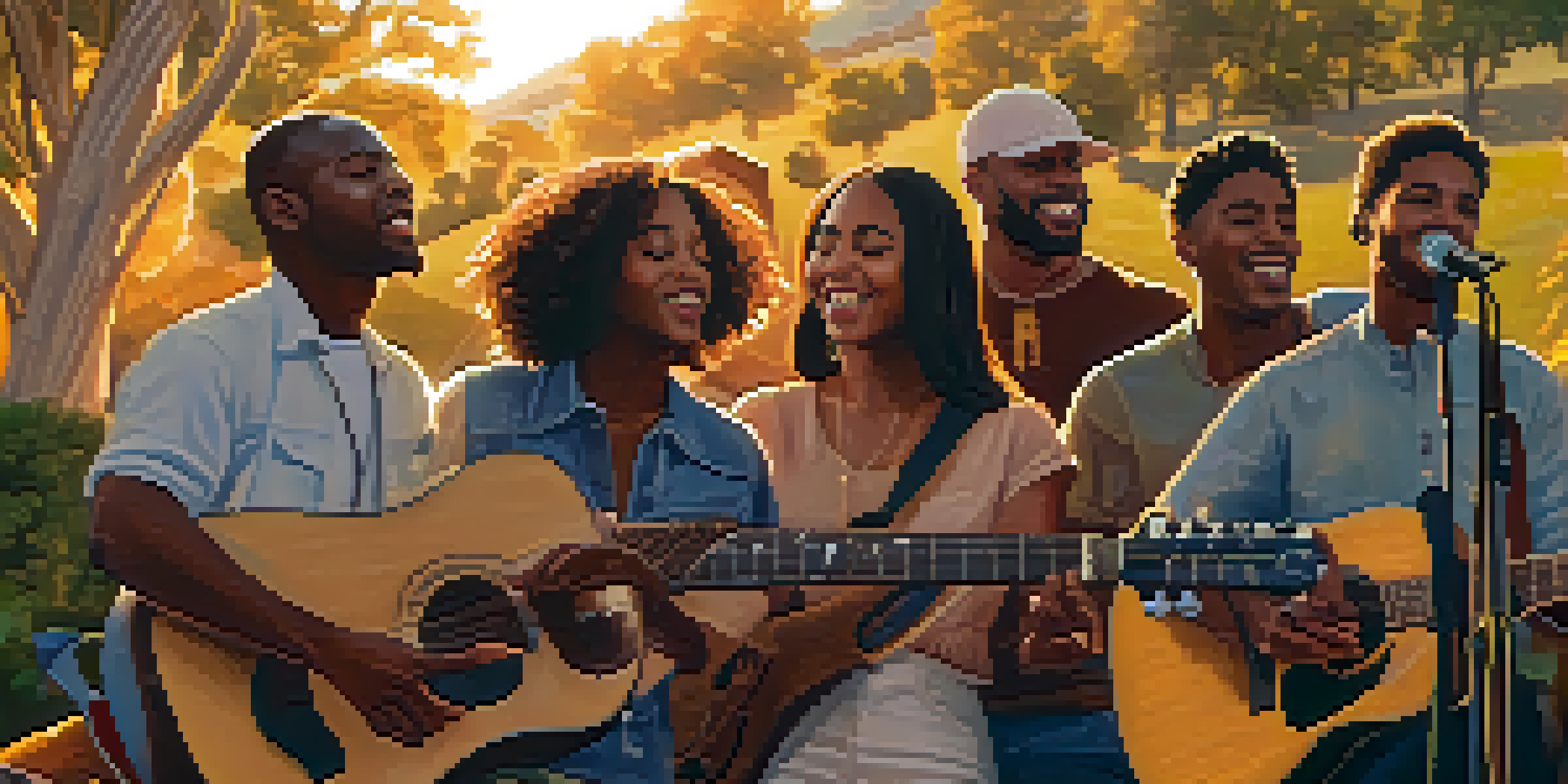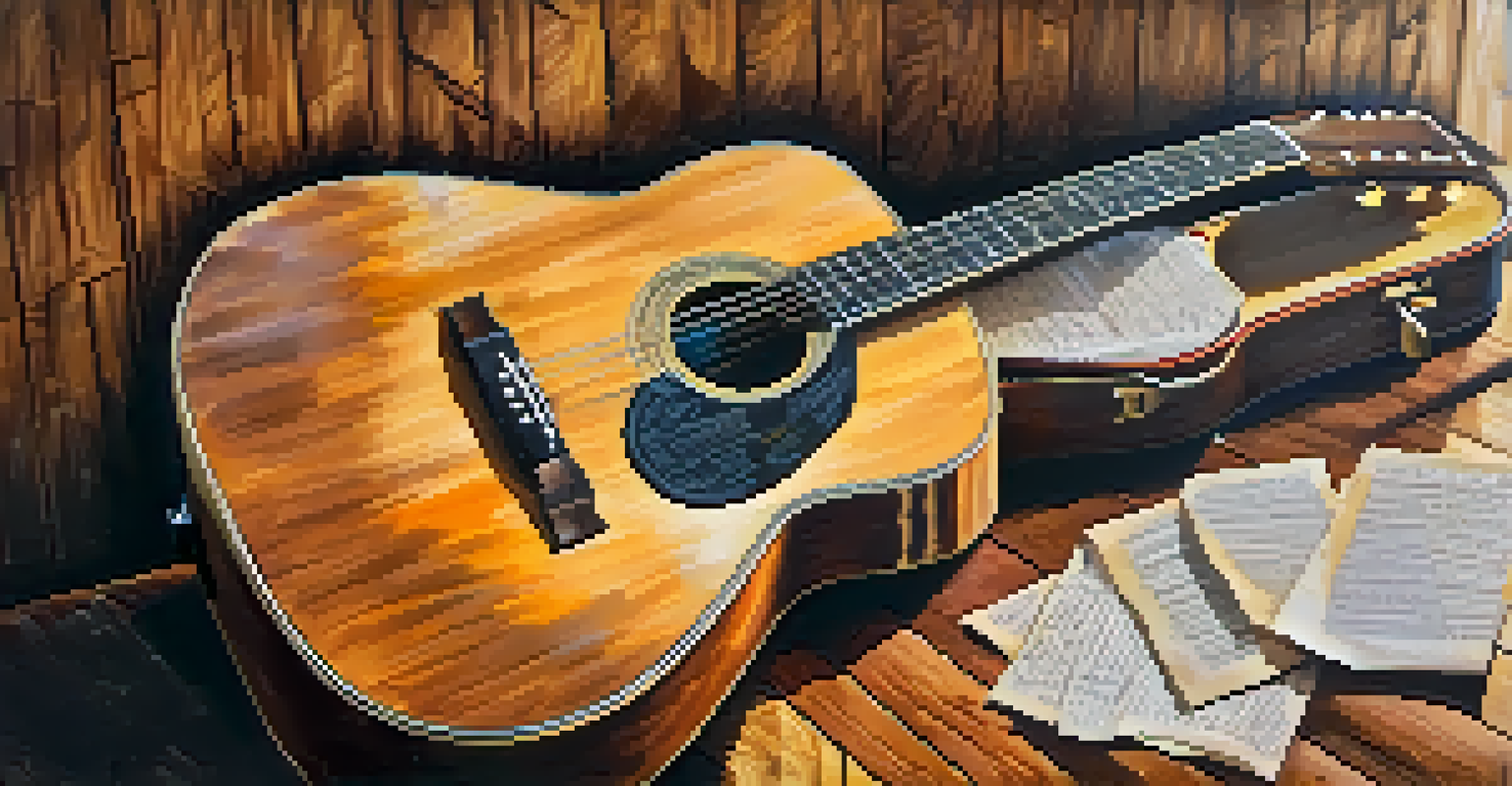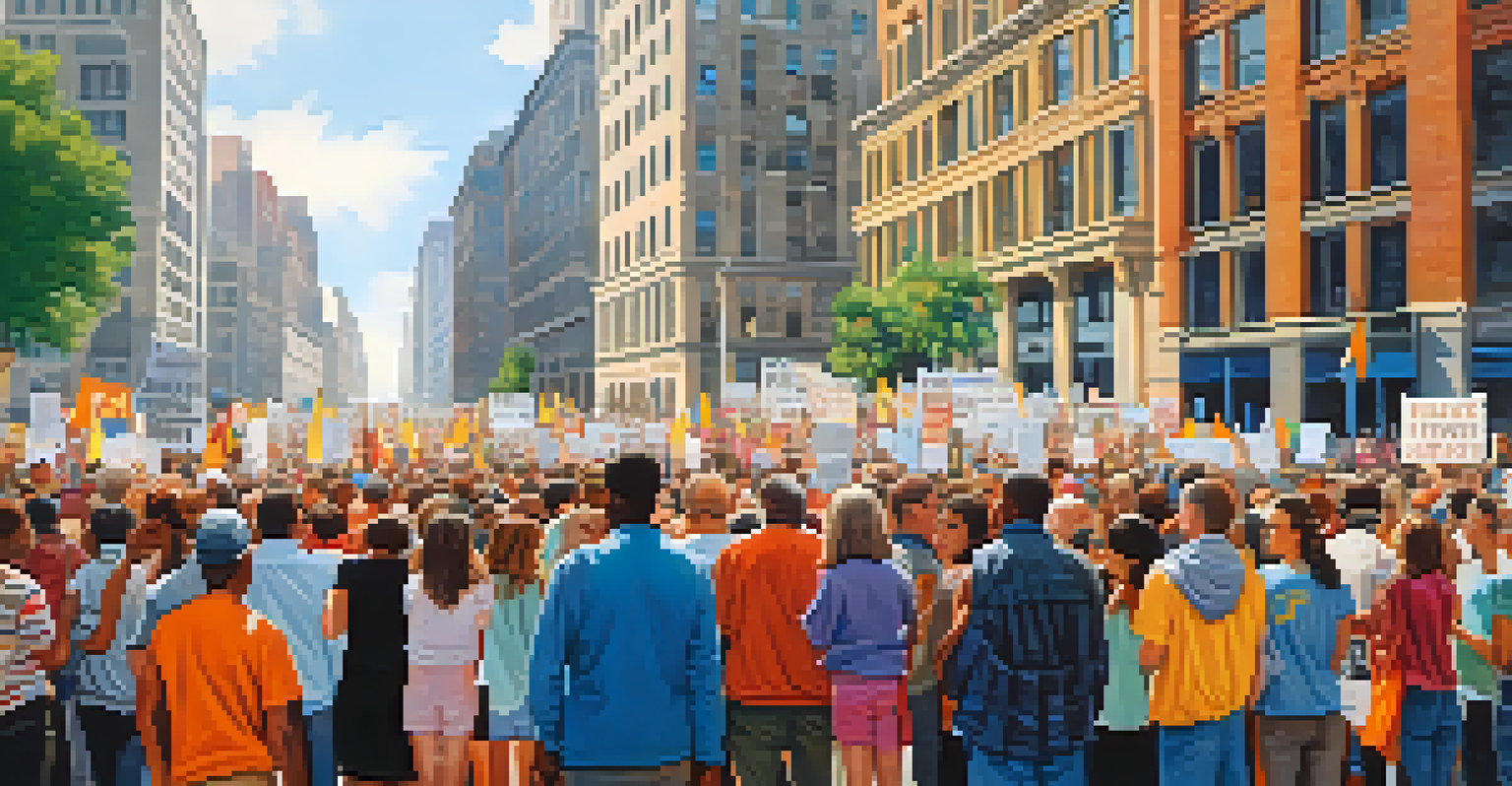The Role of Protest Songs and Guitar in Social Movements

Understanding the Power of Protest Songs
Protest songs have been a powerful medium for expressing dissent and rallying support throughout history. These songs often encapsulate the struggles and aspirations of marginalized groups, making them relatable and impactful. By combining emotional melodies with poignant lyrics, protest songs can evoke feelings of solidarity and urgency, uniting individuals under a common cause.
Music is the universal language of mankind.
Take, for instance, Bob Dylan's iconic 'The Times They Are A-Changin'.' This song not only became an anthem for the civil rights movement but also resonated with a generation seeking change. Its simple yet profound message encouraged listeners to reflect on the societal shifts happening around them, demonstrating how music can inspire action.
In essence, protest songs serve as both a reflection of societal issues and a catalyst for change. They remind us that music can amplify voices that need to be heard, leading to greater awareness and advocacy for social justice.
The Role of Guitar in Protest Music
The guitar holds a special place in the realm of protest music, often serving as a symbol of rebellion and creativity. Its portability and versatility make it an ideal instrument for grassroots movements, allowing musicians to share their message anywhere, from small gatherings to large rallies. The strumming of a guitar can evoke a sense of intimacy, drawing people closer and fostering a shared experience.

Consider the folk music of the 1960s, where artists like Joan Baez and Pete Seeger used their guitars to inspire and mobilize audiences. Their performances were not just concerts; they were calls to action, inviting people to join the fight for civil rights and peace. The guitar became a tool for empowerment, enabling individuals to express their beliefs and connect with others.
Protest Songs Inspire Social Change
Throughout history, protest songs have effectively rallied support and amplified the voices of marginalized groups, encouraging activism and awareness.
Ultimately, the guitar is more than just an instrument in protest music; it’s a bridge that connects artists and activists. It transforms abstract ideas into tangible feelings, making social movements more accessible and engaging to a broader audience.
Historical Examples of Protest Songs
Throughout history, various protest songs have emerged as powerful tools in social movements. In the 1960s, songs like 'We Shall Overcome' became synonymous with the civil rights movement, symbolizing hope and resilience. These anthems not only captured the spirit of the time but also helped to galvanize support for crucial social changes.
The function of music is to release us from the tyranny of conscious thought.
Another notable example is 'Fortunate Son' by Creedence Clearwater Revival, which criticized the Vietnam War and the disparity in sacrifice among social classes. Its raw lyrics and driving rhythm resonated with a generation disillusioned by political decisions, showcasing how music can challenge the status quo.
These historical examples illustrate that protest songs are not merely entertainment; they are integral components of social movements. They document struggles, raise awareness, and inspire people to take action, proving that music can indeed change the world.
Modern Protest Songs and Their Impact
In today's digital age, protest songs continue to evolve and adapt to contemporary issues, resonating with new generations. Artists like Kendrick Lamar and Billie Eilish have used their platforms to address topics such as racial inequality and climate change, crafting songs that spark dialogue and encourage activism. The accessibility of music through streaming services amplifies their reach, making it easier for listeners to engage with important social issues.
For instance, Lamar's 'Alright' became an anthem for the Black Lives Matter movement, with its hopeful message serving as a rallying cry against systemic racism. Similarly, Eilish's 'Your Power' addresses the complexities of power dynamics, encouraging listeners to reflect on their own experiences and responsibilities.
Guitar: A Symbol of Rebellion
The guitar serves as a powerful instrument in protest music, connecting artists and communities while transforming ideas into shared experiences.
Modern protest songs demonstrate that the spirit of activism is alive and well, using music as a vehicle for change. They remind us that while the issues may evolve, the power of song to inspire and unite remains timeless.
The Community Aspect of Protest Music
Protest music often fosters a sense of community among individuals who share common goals and beliefs. When people gather to sing protest songs, they create a powerful collective experience that reinforces their shared values and aspirations. This communal aspect of music can help build solidarity and encourage individuals to take part in social movements actively.
Consider events like the Women’s March, where participants sang songs like 'I Will Survive' to express resilience and unity. These shared moments create a bond among individuals, reminding them that they are not alone in their fight for social justice. Music has the unique ability to transcend barriers, connecting people from different backgrounds through a shared message.
In this way, protest music acts as a catalyst for community building, allowing individuals to come together and empower one another. It transforms individual voices into a harmonious chorus advocating for change, making the movement stronger and more impactful.
Challenges Faced by Protest Musicians
Despite the power of protest music, artists often face challenges that can hinder their ability to express dissent. These can include censorship, commercial pressures, and the risk of backlash from those in power. Many musicians have faced criticism for speaking out, leading to fears of alienating their audience or jeopardizing their careers.
For example, the rapper Meek Mill experienced legal troubles after speaking out against systemic injustices, illustrating the personal risks artists may encounter. Such challenges can create a chilling effect, discouraging musicians from addressing important social issues in their work.
Modern Music Continues Activism
Today's artists like Kendrick Lamar and Billie Eilish address pressing social issues through their music, proving that the spirit of protest remains vibrant and relevant.
Nevertheless, many artists continue to persevere, using their music to shine a light on societal injustices despite potential repercussions. Their courage in the face of adversity underscores the importance of art in activism, reminding us that every voice matters in the fight for change.
The Future of Protest Songs and Social Movements
As we look to the future, the role of protest songs in social movements is likely to evolve alongside technological advancements and societal shifts. With the rise of social media, artists can share their messages more widely and quickly than ever before, reaching audiences that traditional platforms might miss. This accessibility can empower a new wave of musicians to engage with pressing issues and inspire change.
Additionally, as new social movements emerge, we can expect a fresh wave of protest songs addressing contemporary challenges. Issues like climate change, gender equality, and mental health are becoming focal points for artists, reflecting the concerns of a new generation. The adaptability of music ensures that it remains a relevant and powerful tool for advocacy.

Ultimately, the future of protest songs will continue to be shaped by the voices of those passionate about change. As long as there are injustices to address, music will remain a vital part of the social movement landscape, uniting individuals and driving progress toward a better world.